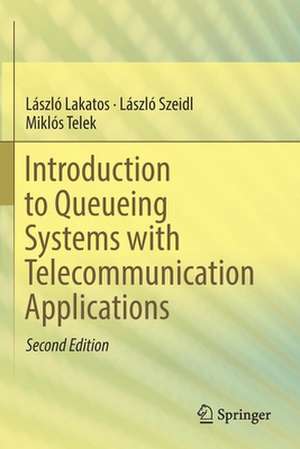Introduction to Queueing Systems with Telecommunication Applications
Autor László Lakatos, László Szeidl, Miklós Teleken Limba Engleză Paperback – 14 aug 2020
The book is the extended and revised version of the 1st edition and is composed of two main parts: mathematical background and queueing systems with applications. The mathematical background is a self-containing introduction to the stochastic processes of the later studied queueing systems. It starts with a quick introduction to probability theory and stochastic processes and continues with chapters on Markov chains and regenerative processes. More recent advances of queueing systems are based on phase type distributions, Markov arrival processes and quasy birth death processes, which are introduced in the last chapter of the first part.
An appendix supplements the technical content with Laplace and z transformation rules, Bessel functions and a list of notations. The book contains examples and exercises throughout and could be used for graduate students in engineering, mathematics and sciences.
Reviews of first edition:
"The organization of the book is such that queueing models are viewed as special cases of more general stochastic processes, such as birth-death or semi-Markov processes. … this book is a valuable addition to the queuing literature and provides instructors with a viable alternative for a textbook to be used in a one- or two-semester course on queueing models, at the upper undergraduate or beginning graduate levels."
Charles Knessl, SIAM Review, Vol. 56 (1), March, 2014
| Toate formatele și edițiile | Preț | Express |
|---|---|---|
| Paperback (1) | 437.72 lei 6-8 săpt. | |
| Springer International Publishing – 14 aug 2020 | 437.72 lei 6-8 săpt. | |
| Hardback (1) | 518.60 lei 3-5 săpt. | |
| Springer International Publishing – 27 mai 2019 | 518.60 lei 3-5 săpt. |
Preț: 437.72 lei
Nou
Puncte Express: 657
Preț estimativ în valută:
83.76€ • 91.27$ • 70.58£
83.76€ • 91.27$ • 70.58£
Carte tipărită la comandă
Livrare economică 23 aprilie-07 mai
Preluare comenzi: 021 569.72.76
Specificații
ISBN-13: 9783030151447
ISBN-10: 3030151441
Pagini: 559
Ilustrații: XVII, 559 p. 96 illus., 4 illus. in color.
Dimensiuni: 155 x 235 mm
Greutate: 0.8 kg
Ediția:2nd ed. 2019
Editura: Springer International Publishing
Colecția Springer
Locul publicării:Cham, Switzerland
ISBN-10: 3030151441
Pagini: 559
Ilustrații: XVII, 559 p. 96 illus., 4 illus. in color.
Dimensiuni: 155 x 235 mm
Greutate: 0.8 kg
Ediția:2nd ed. 2019
Editura: Springer International Publishing
Colecția Springer
Locul publicării:Cham, Switzerland
Cuprins
Preface.- Introduction to probability theory.- Introduction to stochastic processes.- Markov chains.- Renewal and regenerative processes.- Markov chains with special structures.- Introduction to queueing systems.- Markovian queueing systems.- Non-Markovian queueing systems.- Queueing systems with structured Markov chains.- Queueing networks.- Applied queueing systems.- Functions and transforms.- Index.
Notă biografică
The authors of this book have been doing research and modeling in the theoretical and practical field of queuing theory for several decades, and teaching in both BSc, MSc and doctoral programs at the Faculty of Informatics, E¨otv¨os Lor´and University, Faculty of Engineering Sciences, Sz´echenyi Istv´an University and the Faculty of Electrical Engineering and Informatics, Budapest University of Technology and Economics (all located in Hungary).
Textul de pe ultima copertă
The book is the extended and revised version of the 1st edition and is composed of two main parts: mathematical background and queueing systems with applications. The mathematical background is a self-containing introduction to the stochastic processes of the later studied queueing systems. It starts with a quick introduction to probability theory and stochastic processes and continues with chapters on Markov chains and regenerative processes. More recent advances of queueing systems are based on phase type distributions, Markov arrival processes and quasy birth death processes, which are introduced in the last chapter of the first part.
The second part is devoted to queueing models and their applications. After the introduction of the basic Markovian (from M/M/1 to M/M/1//N) and non-Markovian (M/G/1, G/M/1) queueing systems, a chapter presents the analysis of queues with phase type distributions, Markov arrival processes (from PH/M/1 to MAP/PH/1/K).The next chapter presents the classical queueing network results and the rest of this part is devoted to the application examples. There are queueing models for bandwidth charing with different traffic classes, slotted multiplexers, media access protocols like Aloha and IEEE 802.11b, priority systems and retrial systems.
An appendix supplements the technical content with Laplace and z transformation rules, Bessel functions and a list of notations. The book contains examples and exercises throughout and could be used for graduate students in engineering, mathematics and sciences.
Reviews of first edition:
"The organization of the book is such that queueing models are viewed as special cases of more general stochastic processes, such as birth-death or semi-Markov processes. … this book is a valuable addition to the queuing literature and provides instructors with a viable alternative for a textbook to be used ina one- or two-semester course on queueing models, at the upper undergraduate or beginning graduate levels."
Charles Knessl, SIAM Review, Vol. 56 (1), March, 2014
Caracteristici
Examples from modern communication system Accurately established mathematical background (part 1), with intuitive explanations for queueing applications (part 2) Guidelines for application of queueing theory in practice Will serve as a useful reference to quickly look up a theorem or proof
